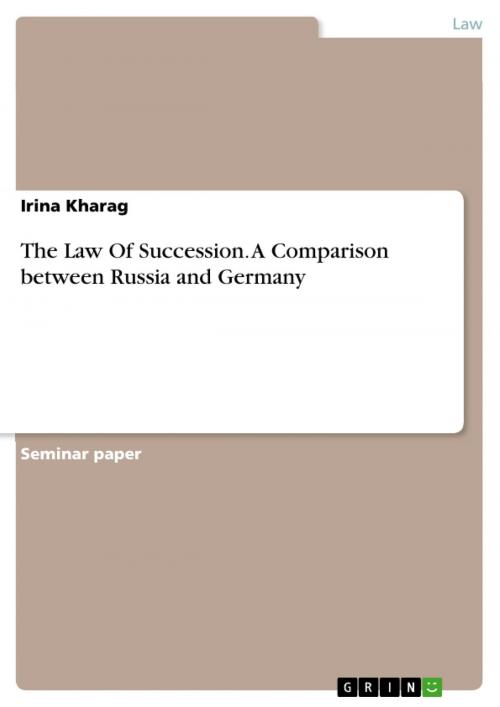The Law Of Succession. A Comparison between Russia and Germany
Nonfiction, Reference & Language, Law, International| Author: | Irina Kharag | ISBN: | 9783640485192 |
| Publisher: | GRIN Publishing | Publication: | December 3, 2009 |
| Imprint: | GRIN Publishing | Language: | English |
| Author: | Irina Kharag |
| ISBN: | 9783640485192 |
| Publisher: | GRIN Publishing |
| Publication: | December 3, 2009 |
| Imprint: | GRIN Publishing |
| Language: | English |
Seminar paper from the year 2008 in the subject Law - Comparative Legal Systems, Comparative Law, grade: 29/30, University of Trento, course: Seminar zum russischen Recht, language: English, abstract: This assignment deals with the law of succession in Russian Federation and Germany. The law of succession does not seem very interesting to the majority of the law students - and wrongly so! It is one of the oldest areas of law which roots go back almost to the Stone Age. It is based on the fundamental human right of property since it obviously does not exist in societies where the individual right to own and to transfer the ownership is not recognized by law or custom. In addition, this topic never stops being actual because nowadays almost everyone is confronted with it sooner or later by inheriting and/or bequeathing. In case of Russia, we can additionally observe the particular situation of a state challenged to establish a new legal system after the collapse of the Soviet Union taking into account human rights in a relatively short period of time. The law of succession as part of legal order had also to be adapted to the new reality determined by the free market economy and developed rapidly. Finally, Germany is one of the leading European countries with a very elaborated codification and broad scope of the judicial review whose example among others is bound to influence the Russian legal experts searching for time-tested patterns and trying to combine foreign experience with the peculiarities of the own country in order to create modern legislation. In the following, we will overview the historic development of the law of inheritance both in Germany and Russia. After this, we will analyze the current legal situation in both countries, attempting to establish its relationship with the respective constitutional law as well as trying to show the similarities and find possible explanations for the differences. The conclusion will then summarize the findings obtained.
Seminar paper from the year 2008 in the subject Law - Comparative Legal Systems, Comparative Law, grade: 29/30, University of Trento, course: Seminar zum russischen Recht, language: English, abstract: This assignment deals with the law of succession in Russian Federation and Germany. The law of succession does not seem very interesting to the majority of the law students - and wrongly so! It is one of the oldest areas of law which roots go back almost to the Stone Age. It is based on the fundamental human right of property since it obviously does not exist in societies where the individual right to own and to transfer the ownership is not recognized by law or custom. In addition, this topic never stops being actual because nowadays almost everyone is confronted with it sooner or later by inheriting and/or bequeathing. In case of Russia, we can additionally observe the particular situation of a state challenged to establish a new legal system after the collapse of the Soviet Union taking into account human rights in a relatively short period of time. The law of succession as part of legal order had also to be adapted to the new reality determined by the free market economy and developed rapidly. Finally, Germany is one of the leading European countries with a very elaborated codification and broad scope of the judicial review whose example among others is bound to influence the Russian legal experts searching for time-tested patterns and trying to combine foreign experience with the peculiarities of the own country in order to create modern legislation. In the following, we will overview the historic development of the law of inheritance both in Germany and Russia. After this, we will analyze the current legal situation in both countries, attempting to establish its relationship with the respective constitutional law as well as trying to show the similarities and find possible explanations for the differences. The conclusion will then summarize the findings obtained.















